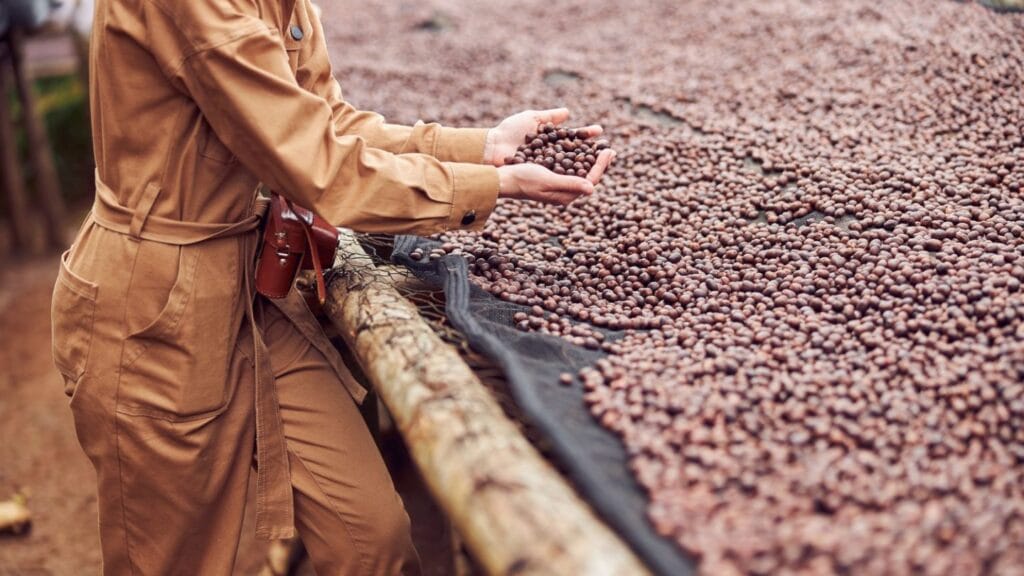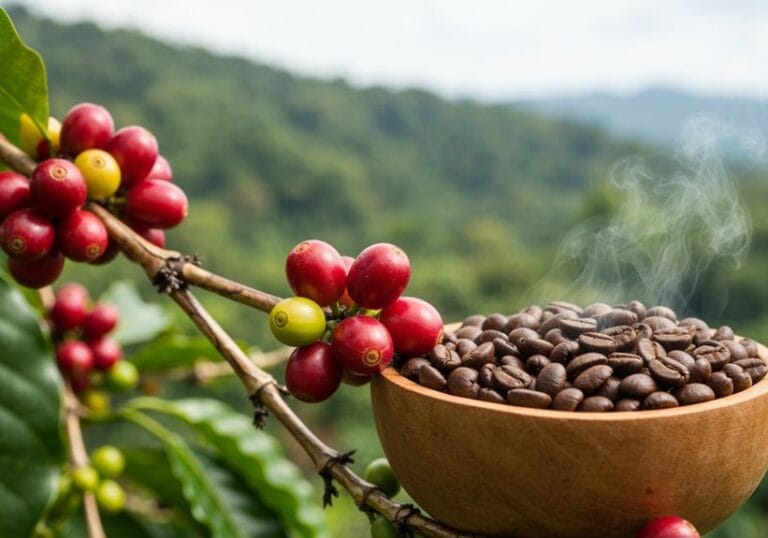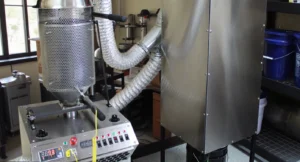Natural process coffee? Oh boy, it’s like letting coffee cherries soak up the sun until they get all fruity and funky! Picture a flavor explosion like strawberries and blueberries on caffeine! This magic happens because the cherries dry with their skins on, kinda fermenting and becoming a wild, wine-like experience in your cup. It’s bold, sweet, and a little unpredictable—like your last blind date! Keep going, and you’ll uncover just how deep this coffee rabbit hole goes!
Key Takeaways
- Natural process coffee involves sun-drying whole cherries, enhancing fruity flavors with minimal water usage.
- The flavor profile is characterized by bold fruity notes like strawberry and blueberry, alongside wine-like sweetness.
- This method allows for complex tasting experiences, with hints of tropical tartness and dried fruits present.
- Compared to washed coffees, natural process coffee offers a distinct, fruity punch due to fermentation during the drying stage.
- Natural process coffee is known for its syrupy mouthfeel, resulting from extended contact with cherry skins.
Understanding Natural Process Coffee
Understanding natural process coffee can feel a bit like trying to untangle a pair of old headphones—you know there’s something good in there, but wow, it’s complicated!
This ancient method, practiced mainly in Ethiopia, Yemen, and Brazil, was born from the need to make coffee in hot, dry climates with limited water. Imagine this: cherries drying under the sun, soaking up all that juicy flavor. Natural process coffee is like the wild child of the coffee world, loaded with fruity, winey notes that can surprise your taste buds (in a good way!). However, it’s not all sunshine; those cherries demand painstaking care, and the process is more labor-intensive than it looks. Fermentation occurs from the moment coffee is harvested, adding to the intricate flavor profile of natural process coffee.
Steps Involved in Natural Processing
In relation to natural processing, the journey of coffee from cherry to cup is nothing short of a soap opera—seriously, grab some popcorn! It starts with harvesting, where handpicked cherries are sorted to guarantee only the ripe ones move forward. Next up, they dry on raised beds, basking in the sun like they’re on a vacation. Here’s a quick breakdown of the steps:
| Step | Description | Duration |
|---|---|---|
| Harvesting & Sorting | Handpicking, remove defects | Ideal ripeness |
| Drying Methods | Spread, raked, turned | 3-6 weeks |
| Fermentation | Natural breakdown, influences flavor | Ongoing during drying |
| Hulling | Remove dried layers to extract green seeds | Essential process |
| Quality Control & Storage | Inspect and store to maintain quality | Ongoing and critical |
Each step’s significant for that delicious, natural processed coffee we crave!
Historical and Geographic Origins

Coffee has a storied past that feels like it could be the plot of a blockbuster movie—full of twists, turns, and a hint of caffeine addiction!
It all started way back in the 9th century in Ethiopia, where some clever goats (or maybe their humans) stumbled upon coffee cherries. They tried sun-drying them—who knew that was the birth of natural coffee?
Fast forward to Yemen in the 15th century, where coffee was hitting the big time, and dry processing became all the rage thanks to arid conditions.
Soon, coffee hopped on a caravan through the Arabian Peninsula, spread to Europe thanks to the Ottoman Empire, and even made its way to the New World, all while keeping its natural vibe alive and well!
Flavor Characteristics of Natural Process Coffee
While sipping on a cup of natural process coffee, one can’t help but marvel at the punchy fruity explosion that dances on the palate—like a fruit party that just crashed into one’s taste buds!
These delicious natural coffee beans bring bold flavors like strawberry, blueberry, and mango to the foreground.
Oh, and don’t forget that wine-like sweetness and acidity—it’s all part of the fun! The extended contact with the cherry during drying turns these beans into syrupy delights, almost like sipping liquid candy.
You might even notice complex notes swirling around, from tropical tartness to cozy hints of dried fruits.
Just be careful—some beans can be a wild card, but when they hit right, it’s pure magic in a cup!
Comparing Natural Processing With Other Methods

Natural process coffee is like that wild friend who shows up to the party and immediately steals the spotlight with their outrageous personality—it’s bold, fruity, and definitely not shy! This method involves drying coffee cherries whole, letting them ferment in their juicy skins.
Natural process coffee bursts onto the scene with bold flavors, boldly fermenting in juicy skins—it’s a party for your taste buds!
In contrast, washed coffees get all pruned and polished, and the flavor is cleaner—kind of like that friend who insists on using a napkin (yawn!).
Then there’s honey process coffee, which is like the middle ground; it’s sticky but not nearly as messy. If you’re searching for the best natural process coffee, you’re in for a treat—the fruity punch it delivers makes it unforgettable.
Just be careful; it’s a flavor whirlwind that demands attention!
Frequently Asked Questions
How Does Natural Process Coffee Impact Sustainability Practices?
Natural process coffee improves sustainability practices by conserving water, reducing energy use, managing organic waste, and aligning with traditional methods that support biodiversity. This approach fosters ecological protection and resilience for smallholder farmers in vulnerable regions.
What Regions Have the Best Natural Process Coffee?
Regions recognized for exceptional natural process coffee include Ethiopia, Kenya, Tanzania, Brazil, Colombia, Yemen, and Central America. Each area showcases unique flavor profiles influenced by local climate, processing techniques, and cultural traditions.
Can Natural Process Coffee Be Certified Organic?
Yes, natural process coffee can be certified organic if produced according to organic standards. This includes using no synthetic chemicals during farming and careful management during the drying process to avoid contamination.
What Are Common Mistakes During Natural Processing?
Common mistakes during natural processing include poor harvesting techniques, inadequate sorting, improper drying methods, insufficient airflow, and neglecting fermentation conditions. These errors impact flavor, quality consistency, and general processing efficiency, leading to undesirable coffee characteristics.
How Should Natural Process Coffee Be Brewed for Best Flavor?
Natural process coffee should be brewed using a slightly coarser grind, gentle pouring techniques, and appropriate immersion methods. Ideal water temperature and consistent brew parameters improve flavor clarity and preserve delicate fruit notes during extraction.
References
- https://sprudge.com/what-is-natural-process-coffee-185926.html
- https://www.fantine.io/2022/coffee-natural-washed-honey-difference/
- https://counterculturecoffee.com/blogs/counter-culture-coffee/coffee-basics-processing
- https://www.youtube.com/watch?v=yagagM7SlWs
- https://hermanoscoffeeroasters.com/blogs/blog/what-is-natural-coffee-processing-and-how-does-it-impact-your-coffee
- https://www.cafeimports.com/north-america/blog/natural-process/
- https://fixxcoffee.com/blogs/glossary/natural-process
- https://homesteadcoffee.com/blogs/news/natural-processed-coffee
- https://noc.coffee/en/blog/coffee-processing-washed-natural-and-honey/
- https://sagebrushcoffee.com/blogs/education/natural-processed-coffee-the-fruit-forward-coffee-process



